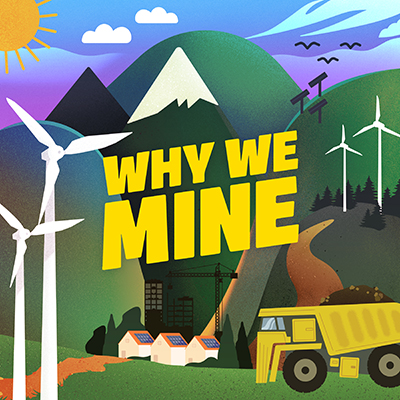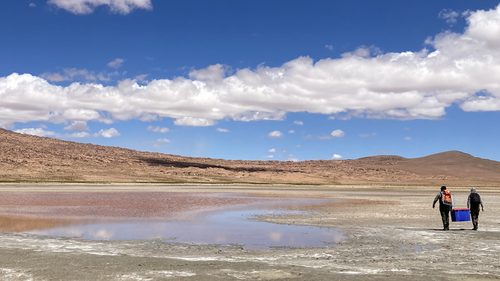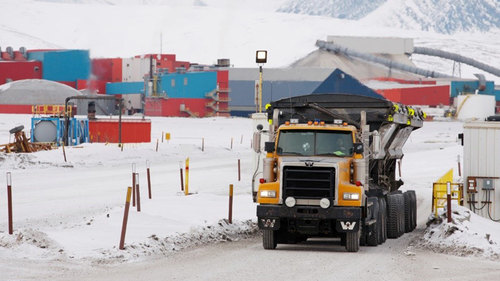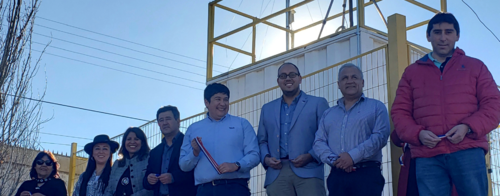Episode 2 Episode 2: Mining For Our Green Future
February 13, 2023
Guests
- Chris Adachi, Director of Climate Change, Teck
- Mark Rabin, Founder and Chief Visionary Officer, Portable Electric
- Jillian Lennartz, Manager Sustainability Reporting, Teck
2
In this episode
The future is here. It’s emerging faster than we can keep up. With the outsized growth in electric vehicles, the demand for more resources to power them, and the challenges with charging everything from cars to fleets of buses, the world is at an energy crossroads. As we look forward to a green future, there are questions about how we’ll get there. In this episode we look at how important mining is to the transition to clean energy.
Guests:
Chris Adachi, Director of Climate Change, Teck
Mark Rabin, Founder and Chief Visionary Officer, Portable Electric
Jillian Lennartz, Manager Sustainability Reporting, Teck
Transcript
00:00:03
Robin Stickley: Twenty plus years in broadcasting, and I finally landed my big interview. I've got you right where I want you now. So, mom and dad, I am chatting with you on the sunny sunshine coast of British Columbia. We're going to talk about electric and electric vehicles, but I thought before we went down that path, tell me all about the first car you ever bought.
00:00:28
Robin's Father: My first car was bought as I graduated from military college, it was an Austin-Healy, a 1962 Austin-Healy 3000 Mark II, three carburetors. A very good looking British sports car, which raced successfully at Le Mans and other major races.
00:00:44
Robin's Mother: And it was candy apple red.
00:00:46
Robin Stickley: Oh.
00:00:47
Robin's Mother: It was gorgeous.
00:00:48
Robin's Father: I bought it in Toronto from a couple that had taken great care of it for a couple of years, and then they were expecting, so there's no appreciable backseat in a Healy, so they had to sell it. I bought it in a heartbeat.
00:01:00
Robin's Mother: I had a little sports car, but nothing like this Austin- Healy.
00:01:04
Robin Stickley: Do you remember what it cost you?
00:01:06
Robin's Father: I know I took out a bank loan with my friendly bank manager, for $3, 500, but I think I had to buy my uniforms and a beer allowance out of that. So I think the Healy was under 3000, which is still a lot of money.
00:01:16
Robin's Mother: I had a little black Sunbeam Alpine, and I got it just as I started teaching. When we got engaged, we decided that it was my car that had to be sold.
00:01:26
Robin Stickley: So you guys, you haven't owned an electric vehicle before. Why were you interested in electric?
00:01:32
Robin's Mother: Well, I think that climate change is here and we all need to do a little bit.
00:01:37
Robin's Father: And this part of Canada has grown by an incredible amount, and we're late joining the parade, but we thought that, yeah, it was something we could afford to do, it would make a bit of a difference.
00:01:48
Robin's Mother: Yeah.
00:01:49
Robin's Father: Help others make a difference, and it seemed just the right next vehicle to go for. As long as the delay is not too long, we will press on with the acquisition of an electric vehicle,
00:02:00
Robin Stickley: Is the waiting list, knowing that you're facing a wait for this vehicle, does that deter you in any way? You could go out and get a vehicle off of a car lot next week if you had to. What does that wait list feel like?
00:02:13
Robin's Mother: We recognize that in acquiring early information about electric cars that there will be a wait, maybe even two years before we get a car. But, I think we're thinking, worth the wait.
00:02:26
Robin's Father: I'd just like to get it before we grow up anymore.
00:02:33
Robin's Mother: Right, while we're still driving.
00:02:36
Robin Stickley: While you're still driving, so that wait time is not going to deter you guys. You're still interested, right?
00:02:41
Robin's Father: Robin, that's an excellent question, and with our age, it's an iffy situation. If they say it would be more than two years, I think I'd just hang up my spurs and forget about it. But if we can get one within two years, we'll probably go for it.
00:02:54
Robin's Mother: Yeah, absolutely.
00:02:59
Robin Stickley: I know my parents aren't the only people having this conversation. The demand for electric vehicles is growing. Infrastructure must change to meet our future requirements. Supply chains built around oil will have to change, or at least adapt the way they've done business, and the products that we mine will have to play an ever larger role in a new world order. It's a simple fact. The global supply of minerals and metals needed to produce clean technologies must rise if the world is determined to decarbonize.
Getting an electric car is one thing, but understanding the huge logistical structures that underpin the manufacturer and operation of that car, well, that's something else to wrap your brain around. But if we don't adjust our production infrastructure, and that includes mining, we run the risk of not keeping up with demand. So, in this episode of Why We Mine, we're asking, what role does mining play in the transition to clean energy? I'll talk to Chris Adachi, Teck's Director of Climate Change, and Mark Rabin, Founder and Chief Visionary Officer of Portable Electric, about how we're preparing for our green future.
I'm Robin Stickley. This is Why We Mine. Okay. To kick things off, I'm back here with Jill, the manager of Sustainability Reporting for Teck, and the scientist with social skills. I love the jingle. So Jill, how do you feel about electric cars?
00:04:40
Jill: Oh my gosh, I love them. I cannot wait to get one.
00:04:44
Robin Stickley: Yeah, I'm with you on that one. I agree. I remember seeing a story years ago about how EVs take a lot more metals to make, compared, to say, gas cars. Is that one true or false?
00:04:52
Jill: It's definitely true. An EV battery and engine are absolute marvels of modern engineering, and they require quite a bit of material to make. While every model of gas and electric car is different in terms of exactly what it's made of, there are some general stats out there on how way more metals and minerals are needed to make an EV.
00:05:13
Robin Stickley: Way more. How much more are we talking?
00:05:15
Jill: Six times as much.
00:05:18
Robin Stickley: Six times, that is a lot. Okay, so how much of that material is not recyclable?
00:05:26
Jill: Oh, only about eight kilograms.
00:05:28
Robin Stickley: How does that compare to a gas car?
00:05:31
Jill: A gas car itself is fairly recyclable, but there are, on average, 850 kilograms of gas burned every year, and that's lost to the atmosphere and not recycled.
00:05:42
Robin Stickley: So sounds like a solution to our own personal carbon footprint is to switch to the EVs, so then, what's the hold back? What's keeping us from doing that?
00:05:51
Jill: Oh, well, to build those EVs, and move to more renewable energy, we need a lot more metals and minerals. As a community, as a people, we need to move to renewable power, and fast, in order to meet our climate goals. But to do that we're going to need a lot more metals. In general, low carbon systems need more metals than high carbon systems.
00:06:15
Robin Stickley: So are there enough metals to make it all happen?
00:06:19
Jill: There are, but, getting them out of the ground, and two manufacturers, at the sheer volume needed, is a bit of a challenge. So, as a global community, as a people, we need to figure out how to manage that, and mine as much as we can in a way that's as responsible as possible.
00:06:39
Robin Stickley: Thanks, Jill. I'm going to check in with the experts now, to dig into this some more.
You're listening to Why We Mine. I'm Robin Stickley. I'd like to begin today's conversation by chatting with Chris Adachi, Teck's Director of Climate Change, about how the mining industry is attempting to meet the needs of the clean energy revolution. Chris Adachi, welcome to Why We Mine. Thanks so much for joining us today, great to see you.
00:07:08
Chris Adachi: Yeah, thanks for having me.
00:07:09
Robin Stickley: Chris, I want to start off with you by chatting kind of big picture here, what are you seeing in the sector right now? I'm talking about kind of a collective we when I say we, but are we on what you would call the right track?
00:07:22
Chris Adachi: The perfect question to start with, I think, Robin. We're making good progress. People are trying to reduce GHG emissions, we're trying to limit the impacts of climate change, but there's a lot of work to go still, right? There's a lot of need to reduce our emissions, and the way we're going to do that is through a whole host of things, right? We're going to need to change behaviors, we're going to need to use new technologies. We're going to have to come up with different technologies that are going to help us. I think realistically there are some reasons for optimism, both societally, but then also in the mining sector.
My first point of optimism here is that we're seeing a pretty smooth or pretty aggressive transition to these alternative technologies. You look at the number of electric vehicles that are being adopted annually, they just keep going up. One of my favorite things to do is to look at forecasts for how many electric vehicles are going to be purchased. I remember about five years ago, there was a report out, they gave a projection, by Year X we're going to be selling 50 million electric vehicles a year. And then you look at that same report the next year, and instead of 50 million, their projection now was actually, that year it's going to be 100 million. And then each year when you update these forecasts, what you see is pretty aggressive uptake of electric vehicles. In fact, in some cases, it's just a limit on supply.
00:08:36
Robin Stickley: Interesting. Chris, you work for a mining company, which we know produces the raw materials that go into these cars. What is the mining industry doing to be more environmentally friendly?
00:08:47
Chris Adachi: What we've seen in the sector is pretty aggressive movement, especially in the last two years, for miners to reduce what we call, in sort of a jargon, Scope 2 emissions. And I'm sure most people listening to this are saying, " What is Scope 2?" It's just a technical description for the emissions associated with electricity production. The majority of our Scope 2 emissions come out of Chile, and historically there's been a significant amount of power generation from coal there, but what we've started to do is convert our contracts. In one of our operations, Indcoil, we converted our electricity supply to 100% percent renewables, two years ago. And then we've got a large project that's set to begin production, land and sea, called QB2, and we've already started to work on that power contract, so we've secured 50% of that electricity supply to come from renewables, and we've got a goal by 2025, we need to get that to 100%, or net zero emissions. When we come back to that question of are we on track, we see, within Teck and within the industry, people making those moves. It's not just talk, it's not people saying where we need to get to, it's actually taking those actions to reduce our emission. We can't wait till 2040, we can't wait till 2050, or the impacts of climate change are going to be that much more significant.
00:09:56
Robin Stickley: Chris, let's talk about renewable energy, things like different methods of recycling, that kind of thing that's changing the landscape for mining right now in order to meet the needs of a green future and the demands that come with all of that, can you talk to us specifically? What are you seeing on the ground right now?
00:10:12
Chris Adachi: Yeah, well, how I think about this is a bit at that large level, and I think the starting point is to recognize to reduce consumption on things we don't necessarily need to consume. And then when we do consume items, you want to move to that reuse and recycle. We see that, one of the things that's great about a lot of the metals that we supply. But as the industry supplies is, they've got some excellent recycling properties. Just take copper or steel as an example. I mean, these metals can be recycled.
I think the first part is metals have that ability to be recycled, reused. And that, to me, is probably one of the key parts of limiting the environmental impact globally is, can we find ways to increase and reuse, recycle these materials? There's always been sort of that secondary market for both of those products for recycling. But as the world looks to decarbonize, I think recycling is increasingly going to be important. But even at high recycling rates, it's going to be difficult to meet growing demands especially. While recycling will play a key role, it looks like any of these products we're talking about, copper, zinc, steel, those are still going to need to come from mining. They're going to need to come from mining in an increasingly responsible way. I mean, in many ways they're responsible now, but we have to continuously improve our performance from a social responsibility standpoint. We're going to have to continue to produce these products to meet that demand.
00:11:35
Robin Stickley: Yeah, everything I'm hearing about recycling is it's certainly part of the solution, but it has its limitations. What do you see, then, in terms of an evolution of our reliance on mining?
00:11:45
Chris Adachi: For the foreseeable future, that's going out to 2058, and to be honest, even beyond that, there is limited, if any, ability to grow our standard of living, to meet our need, to decarbonize, or meet all the other social objectives. What I think will be interesting though, when we talk about reliance, is the way mining is evolving.
I would say one of the sectors that people really don't recognize as shifting fairly quickly is the mining sector, specifically with respect to technology and innovation. Teck, in the last couple years, has put substantial investment, as have other mining peers, on technology and innovation. There are all these different ways mining could evolve and is looking like it's going to evolve, maybe not this decade, but within the next 20 to 30 years. I think there's an opportunity in mining to mine differently, but also, not just the physical mining, but how we partner. What is the role? How do mining companies and miners interact with communities, with Indigenous peoples? How do we co-create these futures that we're looking for?
So, from the supply demand side, the opportunity is clear to me, or the reliance is clear. I mean, I just don't see how you can get around this without substantial change in how people consume items. But that reliance, I think, can continue to be a good thing, right? We can support communities, we can support governments. I mean, mining is good, that it’s hopefully delivering good.
00:13:12
Robin Stickley: Well, Chris, it has been really interesting. Thank you so much.
00:13:15
Chris Adachi: Yeah, thanks for the time, Robin.
00:13:23
Robin Stickley: Next up, EV industry insider's view of the challenges we're facing in meeting the demands of an electrified world. Mark Rabin, Founder and Chief Visionary Officer of Portable Electric is here. We're going to talk about the challenges facing consumers, manufacturers, and governments Mark Rabin, welcome to Why We Mine.
00:14:13
Mark Rabin: Thank you, Robin. Pleasure to be here.
00:14:14
Robin Stickley: So tell me what you are seeing on the ground as we push to get away from gas powered and we're moving towards this electric future.
00:14:23
Mark Rabin: Right. Well, I mean, first and foremost, there are some pretty great tailwinds in terms of regulatory. Governments need to start to make a difference, and need to start to move the needle in some form or another, it's not just recycling, it's not just building upgrades. Our whole entire global transportation network and ecosystem is currently running off of fossil fuels, has to start to transform. There are some great regulatory tailwinds that are happening across key areas, especially in North America and Europe, but there's also a great consumer demand. I mean, people want to feel like they're making a difference, and they're going out there and they're basically voting with their pocketbook, and they're making those investments. So are the grant opportunities or the incentive programs that are there as well. Governments and people are working together to do that.
However, there's also a gap, in terms of, A, if I want to buy an EV today, I've got to wait till 2023. You end up kind of going, okay, well, I'm going to keep my gas car, or I'm going to buy a gas car this time. There's also the charging infrastructure, so there's a bit of a gap in that. If I live in an apartment, how am I going to charge my EV? There's that side on the EV side, but then there's also the fleet side. If you're a city of New York and you have 30, 000 fleet vehicles, there's other challenges there too. So, it's probably the single most exciting time in the history of energy, to be honest, and I think there's a great opportunity for many different stakeholders at the table.
00:15:41
Robin Stickley: Let's talk more about the business angle. Let's look at it this way, is it showing people and companies who are running these fleets full of gas powered trucks, for example, that the long- term gas savings and fuel will be worth it?
00:15:54
Mark Rabin: Yeah, I mean, in terms of total cost of ownership of a gas vehicle versus electric vehicle, I mean, I think it's a no- brainer in terms of your operating costs. If you can make a go at it with batteries in terms of your route, for example, if you can do your whole entire route on one charge, batteries, well, you are saving a significant amount of money in terms of fuel every day. But you've got to bring it back to the depot and you've got to have access to charging.
One of the things I've always said, and will say here, is the second that you get your general contractors, and your laborers, and your construction workers, and the folks that typically today are driving a pickup truck or a cargo van and spending 100, 200, $ 300 a day driving around their region, like for example, lower mainland here, in one day, you could probably put on a couple hundred kilometers just driving around picking things up. Couldn't you have them switching to a battery vehicle where they're bringing it back home and charging it and they're saving a couple hundred dollars a day? That's the final nail in the coffin for the internal combustion engine. And I think Ford knows that, and we're seeing that already starting to happen.
00:16:53
Robin Stickley: What about cities now? Municipalities and electrifying their fleets, of say, buses, that kind of thing, Mark? Because again, we go back to the charging infrastructure needed to decarbonize passenger transportation. For me, whoa, that brings about a whole chicken and egg thing in my mind. Where do you go first?
00:17:10
Mark Rabin: Well, first, doing nothing is not an option. When I look at these things, people go, " Well, you know what? In 50 years, it'll be different. Let's wait and see." Well, we know that that's not an option anymore. So no matter who you are, if a city, you've got a fleet of buses, or you've got fleet vehicles, or your delivery company, you have to start to make some moves in that direction because you don't want to be left behind. There are going to be new competitors that could come in that are going to understand how electric vehicles work, how to re- route their routes, how to charge them properly. It's not a wait and see thing, it's a let's get going now, let's get those data points and let's understand how it works.
We're seeing it, cities are coming out with buying electric buses, they're also buying hydrogen buses. They're trying to understand, where's that limit? Because you're not going to have electric long haul trucks, I don't believe you're going to have that many long haul electric trucks. They're probably going to be more along the lines of hydrogen, or hybrid. But for short haul or shorter deliveries, you can do that on an electric.
I think it's going to be a fine dance between not being seen as a laggard, and so taking those steps, but also using the data generated from driving those buses around for hundreds or thousands of hours, understanding how are we going to charge these things in the municipal yard? How are we going to charge these things while they're all in route? We've all seen those electric roads where they say, for these couple of kilometers, you're going to be able to charge your vehicle as you're driving.
00:18:22
Robin Stickley: The changing times. What do you think it'll mean, in the mining world specifically, to keep up with supplying what's needed for this electric future? What will it mean for resources that go into things like what we're talking about here, the charging stations, batteries, and the like?
00:18:36
Mark Rabin: My mind went in two directions. One is, first, how do we mine those minerals? We are starting to see large mining trucks going electric, with sort of regenerative braking as they go down the hill, they're charging their batteries. Or when you go underground in your all electric, you save money on ventilation, for example. So, we are starting to see the mining industry going electric, and I think that's super exciting. We're going to see hydrogen, as well, come in for the heavier vehicles, absolutely.
In terms of actual access to those resources, we do have issues around rare earth minerals. Obviously, there's some concentration of those in key countries that we have to be really aware of. Energy security and security of minerals for the next wave of the energy transition, it's going to be critical to understanding that, and luckily Canada does have a lot of these minerals, and we've got some of the top mining companies in the world that are here, that are mining these, whether it's in Canada or either place in the world. I do think we need to understand the roadmap. If I was investing in the future of energy transition, what minerals and what base metals are going to be required for the next 100 years and start to make that roadmap. I've not been involved in any of it, but I really hope that Canada is coming up with these plans and strategies to look out into the future in the next 100 years, and say, " Okay, where do we need to protect our natural resources? Where are these resources going to be going? Where do we need to invest today, in that? Where do we need to invest in recycling, or upcycling, of those minerals?" And, for example, battery technology, we're starting to see large scale battery recycling and upcycling.
00:20:01
Robin Stickley: Governments can change in Canada every four years, sometimes faster than that. Will that change anything around electrification? When governments change, do the rules change? Is that a thought or a concern?
00:20:12
Mark Rabin: Absolutely. What I think we're going to see, though, is there's going to be a general coming to the center in terms of sustainability and climate. This whole right, left, or this polarizing thing where it's one side saying, " Climate's important, we have to go green." And the other side saying, " That doesn't really matter, cut costs." There has to be a consensus, at some point here. We can disagree on one or the other in terms of other things, but I think when it comes to the climate, investing in climate opportunities, new technologies, I don't see a government saying that's not an opportunity. It's just good for the economy to also invest in new technologies that make things more efficient, in building upgrades and retrofits, in modernizing the automotive and transportation sectors.
Even what we're seeing with the airline sectors, I just read today that right Harbor Air flew their first point to point service from Vancouver to Victoria on their e-Beaver plane. So, it's just one plane, but, damn that's cool. And knowing all of that is supported by Transport Canada, and their technologies, the people that help them do the electric engines like magniX. Everybody's in on it, that's the thing. I think it’s going to be really strong general consensus happening across all governments to say, "Okay, look, this is where the market's going, this is where people are spending their money. This is going to be the single biggest opportunity." And governments who aren't aligned with that will be left on a back footing. And I think that that's longer term, even the most sort of militant, autocratic governments are starting to even look at this, you can see it all over the world.
00:21:43
Robin Stickley: Let's talk about the next decade or two now, as we kind of wrap this up, a look to the future. What do we need to be aware of as we try and tap more resources for this increasingly electric world and future that we're headed for?
00:21:57
Mark Rabin: First and foremost, I do think government needs to understand the roadmap, where we're going, and what we're doing, and what resources are going to be required. What is the workforce need to look like? In terms of immigration, who we need to bring in for immigration. It's to gear the entire economy towards both innovation, really helping and support those next waves of technologies, but also putting policies in place that are not just two year, three year, four year. In terms of the resource industry itself, I mean, I think the resource industry in such a great spot right now, to really sort of start to look at what are those minerals that are going to be required? We're still going to need metallurgical coal to do certain things. I think it's just about, where can we be super efficient? Where can we have major gains? And then where do we need to rely on the fossil fuel resources that we have to get us to where we're going?
For example, the hybrid vehicles, a perfect example, gets way more efficient, get us to where we're going, and it's a great stepping stone to the next stage. So, for me, it's about looking at holistically, being pragmatic, common sense, but really coming up with a bold vision for where we're going, and making that everybody has to kind of agree, " Hey, we're going in this general direction, let's jump on board." Because, I always say this, any civilization intent on surviving would not be doing what we're doing today. And I think, you can even talk to a five year old, you can talk to a ninety year old, what's going on today on this planet is not sustainable at all. And it's not rocket science, it's not for or against any industries. It's just that what has got us here today isn't what's going to get us there tomorrow. I think we need to start to move at an alarmingly faster pace to what we're doing today.
I don't know what it's going to take to really have that major, major wake up call, but we're starting to see it all around the world in terms of increasing climate disasters and increasing impact on families' livelihoods. So, I'm hopeful, but I do believe that every industry, even the mining industry needs to be at the table in this conversation, and we really need to advance this. Canada has a great opportunity, let's just not be so Canadian. Let's take a leadership role, let's go out there and let's do this.
00:24:02
Robin Stickley: I just want to say thank you, Mark. That was a really fun, very informative chat, and thanks for your time and your insight today.
00:24:08
Mark Rabin: My pleasure.
00:24:18
Robin Stickley: I worked with a tremendously talented news cameraman years ago, as acCub reporter. And when we would get stuck working on a complicated story, or maybe we'd even just get lost, like literally lost chasing a breaking news story, he had a great way of stepping back and leveraging a bit of common sense with this very simple phrase. He'd drop everything, he'd turn to me and he'd say, "Okay kid, how do we get there from here?" And his words came back to me when I was considering what I've learned about this green future that we're marching towards. And here's the truth, the how we get there feels a bit counterintuitive, but I'm learning to lean in to shifting perspectives.
What I understand is the path to a decarbonized world where clean technologies are the rule, is by way of the products of mining. So, sure, maybe that sounds simple, but I don't know how many of us actually connect those dots day- to- day. Metals, minerals, are indispensable in achieving global climate targets. Reduce, reuse, recycle, yeah, absolutely, but that's not a standalone solution. Meeting our net zero emissions goal by 2050 in Canada is an impossibility without the products of mining. Whether it's building the infrastructure we need to charge a fleet of electric buses, or changing the way we design and run our homes to have less impact on the planet, the widespread adoption of clean technologies draws a clear picture for me, a new understanding for our reliance on mining and how we begin to get there.
I'm Robin Stickley. Thanks for listening to this podcast, brought to you by Teck. This is Why We Mine.
Why We Mine is brought to you by Teck. Our producer is Andrew Pemberton-Fowler. Our sound engineer is Diego Domine, and our production assistant is Hugh Perkic. Additional production support provided by JAR Audio.
Bonus Content
Also in this series

EPISODE 6
Episode 6: Better Than We Found It
We all know mining disturbs land, so proper land reclamation is a critical part of the process. Modern mines aren’t just cleaning up after themselves. Their goal is to leave an area better, stronger, and more diverse than they found it.

EPISODE 5
Episode 5: Mining and Investing in Global Communities
How does the mining industry ensure it builds strong relationships with communities and Indigenous Peoples, respects human rights, and creates lasting benefits in the regions where it operates? In this episode, we explore the many ways mining companies co











